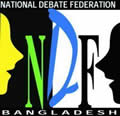What is Debate?
“I may be wrong and you may be right and, by an effort, we may get nearer the truth.”
Karl Popper
Debate is a formal contest of argumentation between two teams or individuals. More broadly, and more importantly, debate is an essential tool for developing and maintaining democracy and open societies. More than a mere verbal or performance skill, debate embodies the ideals of reasoned argument, tolerance for divergent points of view and rigorous self-examination. Debate is, above all, a way for those who hold opposing views to discuss controversial issues without descending to insult, emotional appeals or personal bias. A key trademark of debate is that it rarely ends in agreement, but rather allows for a robust analysis of the question at hand. Perhaps this is what French philosopher Joseph Joubert meant when he said: “It is better to debate a question without settling it, than to settle a question without debating it.”
The Karl Popper Debate Format
At the secondary school level, IDEA debaters follow the Karl Popper debate format, which places students in two teams of three members. Teams are presented with a ‘resolution’, such as “Economic development should be valued above protection of the environment” or “Human genetic engineering is immoral”. The team affirming the resolution speaks first. The opposing team then must refute the arguments offered by the affirming team and offer arguments rejecting the resolution. Both sides are given the opportunity to present their positions and to directly question the opposing team. Neutral judges – usually parents or teachers – evaluate the persuasiveness of the arguments and offer constructive feedback on such elements as faulty logic, insufficient evidence and arguments debaters may have overlooked. Debate teams are judged strictly on the merits of their arguments.
Debate and Democracy
Debate is not a forum for asserting absolute truths, but rather a means of making and evaluating arguments that allows debaters to better understand their own and others’ positions. This sense of a shared journey toward the truth brings debaters closer together, even when they represent opposing sides of an issue or come from vastly different cultures or social classes. In so doing, debate fosters the essential democratic values of free and open discussion.
